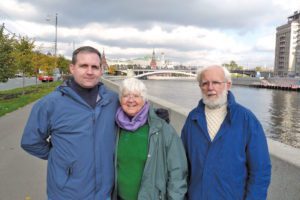
Whelan with his parents in Moscow before his 2018 arrest. Set up by a “friend” and convicted of espionage, he was described in Russian media as a candidate for a prisoner exchange. Now that window appears to have closed.
Trevor Reed, a former Marine and prisoner held in Russia, like their son, Paul, walked off a plane to freedom, as part of a prisoner exchange with Konstantin Yaroshenko, a pilot who was serving time in the U.S. on drug-smuggling charges.
Bittersweet, because it once seemed possible that Yaroshenko might be exchanged for the Whelans’ son, Paul—another ex-Marine who’s been held on trumped-up espionage charges since 2018.
“Three months ago, I would have thought that a prisoner swap would be likely,” emails David Whelan, Paul’s twin brother. “But now, with Yaroshenko back in Russia and Russia heavily sanctioned for its illegal invasion of Ukraine, times are different. Any solution will take time.”
The Russian Federal Security Service, the FSB, “stole Paul Whelan’s freedom three years ago,” David told the Manchester Mirror last December. “Now Paul sits in a Russian labor colony, waiting for justice after being convicted in a secret trial with secret evidence. I’m sure he waits in vain. At least he can hope for his freedom.”
Paul Whelan is serving a sixteen-year sentence of hard labor after being detained in a Moscow hotel in 2018 and accused of spying. A Russian “friend” had just given him a USB thumb drive of what he said were family photos. Before he had a chance to look at it, FSB agents burst into the room and arrested him, claiming it held classified documents.
David Whelan recently told NPR that Russian media immediately speculated that his brother might be exchanged for Yaroshenko or Viktor Bout, the arms dealer known as the Merchant of Death. “At one point it was also [convicted hacker] Roman Seleznev, who is the son of a Duma legislator.”
“We have never advocated for a swap or exchange as a solution,” David emails. “It may be that, as in the case of Trevor Reed, that is the best way to get Paul released. But fundamentally, any concession the US gives—and that’s the whole point of these arbitrary detentions—creates the potential that other nations will arbitrarily detain more American citizens.”
Paul was unable to speak to his family from January 2019 to September 2020. Since then, he has been able to phone his parents and the U.S. embassy in Moscow. The calls “have been more regular since the prison warden at his labor colony was arrested for corruption last November,” David writes. “The new warden seems to follow the prison regulations more closely or doesn’t allow as many bribes …
“Sometimes there are issues to deal with, but just as often, it’s an update of the daily lives of two elderly people in a small village in Michigan: the summer ice cream socials, the local clubs, the weather and the yardwork…. our dad will be eighty-five and our mum will be eighty-three this winter. I am constantly amazed at how well they handle what can only be difficult conversations.”
The calls were interrupted when Paul was hospitalized “against his will and then thrown in solitary confinement for 30 days,” David writes. Because his brother has been classified as a flight risk, he is also “woken up every 2 hours, every night. Lights are turned on, blankets pulled away from his face, and photo taken, every two hours. This has been going on at least since September 2020 …
“It’s not just the injustice of Russian hostage diplomacy,” David writes. “It’s the stolen years with our parents as they age, missing Christmases and birthdays and family time. It’s the stolen life, as one by one, Paul lost his job, his home, his ability to communicate and be with friends.”
The twins and their siblings—brother Andrew and sister Elizabeth—grew up in Ann Arbor, on Brentwood Ct. and then on Tanglewood Dr. Now they are acting as Paul’s advocates and support system.
Before the invasion, they could send Paul money via Western Union to buy things like toilet paper, toothpaste, and simple foods. Now financial sanctions have shut down that channel, putting the burden on the skeleton staff at the Moscow embassy.
According to David, just three people there now monitor the cases of more than twenty Americans imprisoned in Russia. Most recently, WNBA star Brittney Griner was wrongfully detained in February after customs officials said they found hashish oil vape cartridges in her luggage.
Though his brother was “pretty shattered” to be left out of the Yaroshenko exchange, David writes, in a later phone call, “our parents said that he sounded more like himself again.”
As far as wishing for another prisoner swap, “I don’t know that I would ever want Viktor Bout released,” David writes. “Not just that he’s an awful person, but what impact will it have on the dozens of countries that currently engage in arbitrary detention of Americans?”